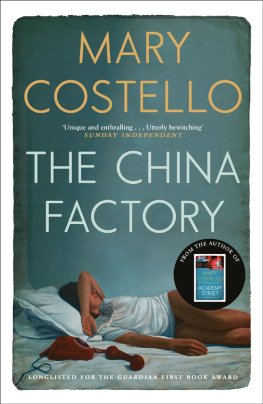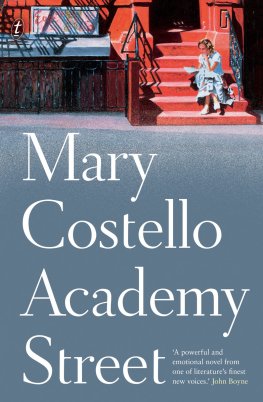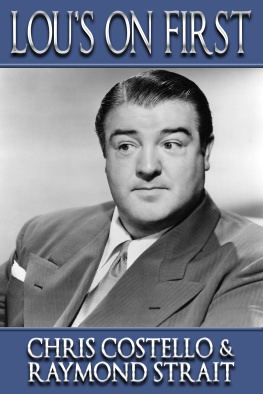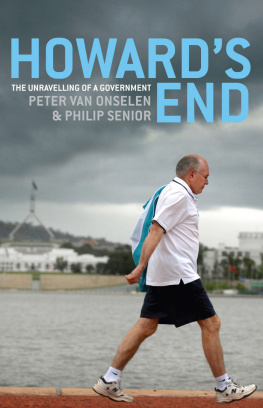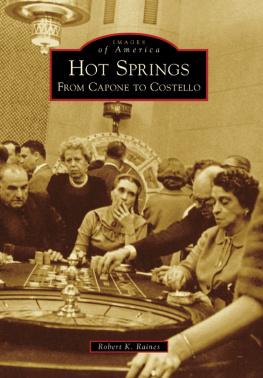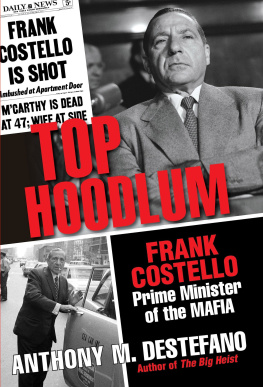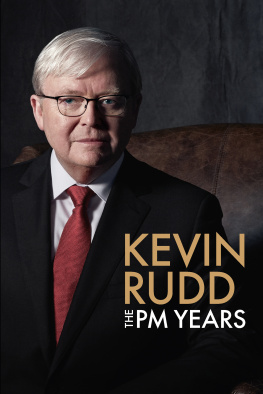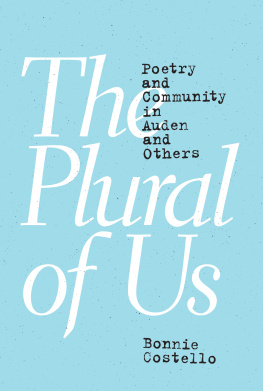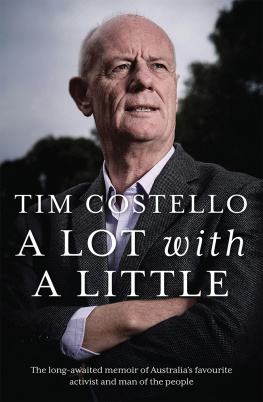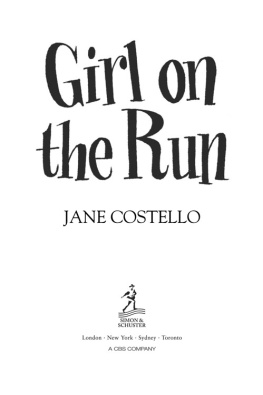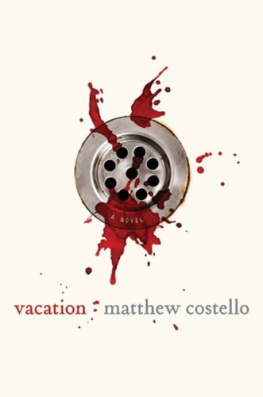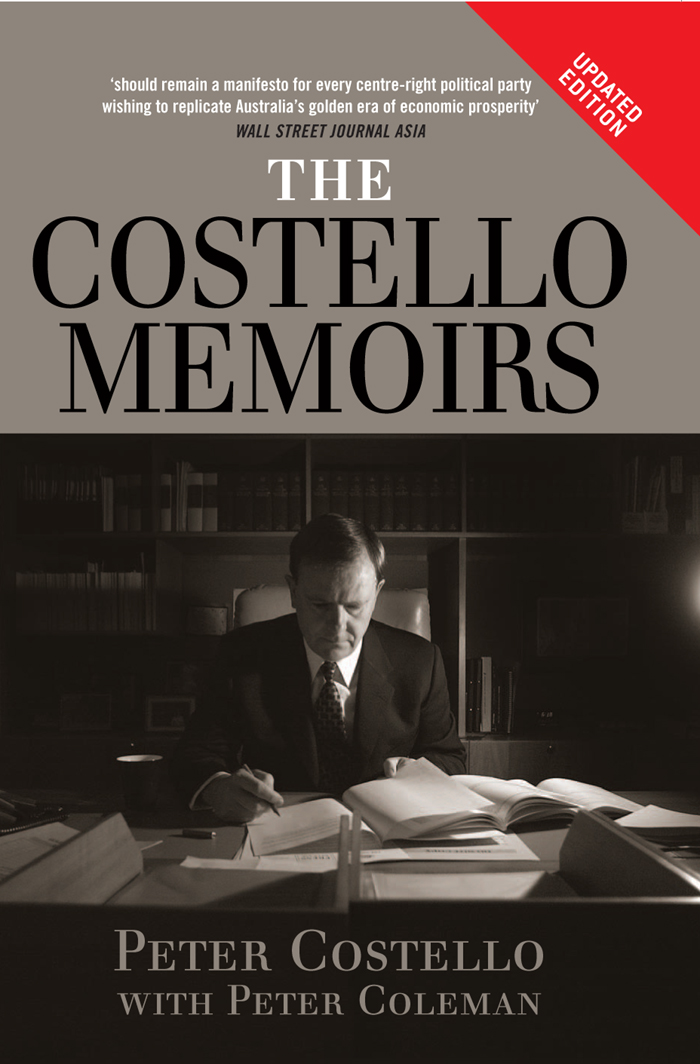THE
COSTELLO
MEMOIRS
THE
COSTELLO
MEMOIRS
The Age of Prosperity
PETER COSTELLO
WITH PETER COLEMAN

MELBOURNE UNIVERSITY PRESS
An imprint of Melbourne University Publishing Limited
187 Grattan Street, Carlton, Victoria 3053, Australia
mup-info@unimelb.edu.au
www.mup.com.au
First published 2008
Paperback edition published 2009
Text Peter Costello, 2009
Design and typography Melbourne University Publishing Limited, 2009
This book is copyright. Apart from any use permitted under the Copyright Act 1968 and subsequent amendments, no part may be reproduced, stored in a retrieval system or transmitted by any means or process whatsoever without the prior written permission of the publishers.
Every attempt has been made to locate the copyright holders for material quoted in this book. Any person or organisation that may have been overlooked or misattributed may contact the publisher.
9780522859393
National Library of Australia Catalogue in Publication data available from the National Library of Australia.
PREFACE
Peter Costello has never been a predictable politician. Whatever they may say, most of them do not go into Parliament to bring about particular reforms; they go in because they find the life is irresistible. They want to be in it all their lives. They enjoy its exhilarating highs and take its miserable (and tedious) lows in their stride. They face long years in the wilderness with equanimity. They take for granted the slander of fools. They also believe that the voters will get it right in the end. Their day will come. They are politicians in the way others are poets. They cant help themselves.
Peter Costello is not like that. To him all that stuff is the excuse of the seat-warmer, the hack, the careerist, or at best the adventurer. He belongs to a different parliamentary tradition. He went into Parliament to make changes to the Australian settlement. He wanted to liberalise the economy, especially the system of taxation. (A dental technician with gallows humour drilled the letters GST on a crown for one of his teeth damaged beyond repair by constant grinding during the GST debates.) He wanted to strike a blow for individual rights against union bullies. (He first came to public notice as the champion of the small company Dollar Sweets against the thugs of the Federated Confectioners Association.) He wanted to bring indigenous Australians into the mainstream. (He was gratified to see Noel Pearson reading FA Hayeks The Road to Serfdom.) He was determined to advance liberal multiculturalism within the Australian tradition of tolerance and freedom. (Why come to the country at all if you despise everything about it?) From the containment of communism to the war on terrorism, from voluntary student unionism to the republican referendum, he has been an agent of liberal change.
Throughout his eleven to twelve years in Government he was an indefatigable, totally committed Treasurer. He is also a splendid parliamentary performer. In my years in state and federal Parliaments I never saw his equal. Yet when he is no longer able to achieve the changes he believes in, he wonders whether it is worth sticking around. These memoirs may be either an apologia or a platform.
Several political currents meet in Peter Costello: conservative, liberal, radical. One key to his life and work is that he is a Christian reformer. His religious faith has always been important to him. It has become even more important as he has grown older. He believes that divine intervention helped Tanya, his wife (and my daughter), recover from a grave illness in 1987. His hope for redemption and Gods forgiveness is central to his life.
Christian reformism is a continuing, if minority, tradition in Parliament. Ordinary membersworldly, sceptical, practicaloften dub the men and women of faith the God Squad. At one time in the House of Commons, cynical conservatives labelled them the YMCA. Yet these reformers have leavened the lump. They have been at the heart of most successful movements for social reform.
Throughout his years as Treasurer (and before that, in Opposition) Costello has been a leader in all the principal decisions of the Coalition. His Budgets and tax reforms restored the economy, stimulated investment and employment, and underpinned major policies ranging from the family to the arts. He brought the Australian economy back from being the sick man of Asia to becoming one of the very few able to withstand the Asian meltdown of the late 1990sand to revive Indonesia, Thailand and South Korea. He contributed significantly to the strategic decisions on East Timor, Iraq and Afghanistan.
His policies do not command universal assent, even among reformers. I, for one, do not always agree with him. As an in-the-bone federalist I cannot accept his centralist hostility to the states and states rights. I am not as convinced as he is that a republic would be a beneficent influence on Australian freedoms or self-respect. But these differences could not disrupt our collaboration. We discussed, edited and improved on each draft as we worked through the themes we agreed were central to the book. I did not press my disagreements.
These are his memoirs, not mine. In any case I found some of his reformist positions persuasive enough for me to reconsider my own. He supported the apology to Aborigines for their dispossession and associated grievancesprovided any apology be accompanied by the policies now known as the Northern Territory Intervention. He wanted the Government to ratify the Kyoto Protocol since Australia (unlike some countries that had already signed it) was meeting the Kyoto targets. Both may be symbolic, but I agree with him that symbols have a potency of their own.
Costellos story is one of high achievement. He helped create and managedthe Age of Prosperity in Australia. He should have been Prime Minister. It was his misfortune to come up against a man whose determination to hang on to power, while not Mugabe-esque, was unyielding. John Howard is not an unusual case. The pain and frustration in dislodging Prime Minister Hawke or Premiers Askin and Bjelke-Petersen are fresh in memory. Tony Blair was as unwilling to vacate 10 Downing Street as Howard was to vacate Kirribilli House (although Blair finally made way for his successor). The United States set the world an example in constitutionally limiting the number of years a president may remain in office (and even there Bill Clinton strove mightily to return to the White House on the coat-tails of his wife).
These memoirs record the long saga of the HowardCostello contest. Costello writes of Howard in a restrained and generous way. He declares plainly that he regards him as Australias greatest Prime Minister after Sir Robert Menzies. But he also tells the story of the agreement, understanding, deal or whatever, summarised in the McLachlan Memorandum, about the proposed transition of Liberal Party leadership from Howard to Costelloand the differing interpretations of that memorandum. It is a dispiriting record of loyalty and frustration, of egoism and betrayal. Should Costello have resigned in protest? He believes that would have badly damaged the Government. The dismal details, through to the final catastrophe, are all here. The reader will judge.
Peter Coleman
Saturday, 2 August 2008
CONTENTS
AUTHORS NOTE
The number of Australian Members of Parliament and Ministers that have recorded accounts of their time in office is small. Very few of those are on the Liberal side of politics. Some claim that this shows Liberals lack an interest in history. This book will, I hope, prove to the contrary.


